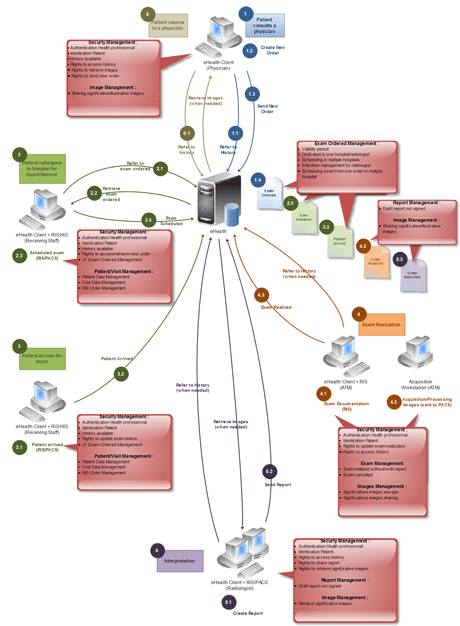Storing images and medical reports for long periods of time is becoming a challenge for medical institutions. Technology developed to collect detailed images from patients’ bodies is producing an increasing quantity of large files that need to be stored for many years and to remain accessible when requested. This context has driven CRP Henri Tudor and the Health Ministry of Luxembourg to collaborate in the definition and implementation of a common project, named CARA (Carnet Radiologique). The main objective of this project is to set up IT solutions to improve the quality of the information available in the National Electronic Medical Record (EMR) without excessively increasing the size of this database; and to provide appropriated services for health professionals to access, manage and use, according to strict security policies, the content of the EMR.
Improving the quality of health care and reducing unnecessary costs are two major challenges for the health community. Reducing redundancy in exams due to misinformation about existing health data, especially in radiology where there is a risk of overexposure to radiation, is at the heart of the research carried out in the CARA (Carnet Radiologique) project developed at the Resource Center for Healthcare Technologies (CR SANTEC) of the Centre de Recherche Public (CRP) Henri Tudor in Luxembourg.
To achieve the initial objectives of the project, we face a set of organizational, technical, semantic and legal problems (see Figure 1). First, by virtue of the huge amount of data produced by radiology, appropriate storage space is required. In addition, we must be able to guarantee that the data can be kept for a long, predefined period of time. Second, problems exist in the data integration phase, mainly due to heterogeneous aspects of both the data (from a structural and semantic point of view) and the environment from which the data comes (eg hospitals or private practices). This also implies security issues, since users providing the data must be identified, the access to the data must be controlled, and the integrity and confidentiality of the data must be preserved. Finally, the exploitation of the preserved data is also problematic. The fast and accurate retrieval of relevant results from the huge quantity of stored information is particularly crucial, since doctors base critical diagnoses on the retrieved data.

Figure 1: The CARA approach.
Our research addresses all these problems. In order to improve data storage, we must first define the concept of relevant data. Only some of the images produced can be usefully exploited by doctors in making a diagnosis: such images can be considered relevant and must be identified and stored in an adapted structure. In order to facilitate data integration, we plan to define a common structure for medical documents such as prescriptions and reports, which will simplify both the capture of the medical information by doctors and the integration and indexation of the data (including images) by the system. The use of existing standards like HL7 will also speed up the integration of the data by providing a common framework for addressing technical interoperability during the data exchange between health actors.
A particularly challenging aspect of our research addresses data exploitation issues. It is necessary that data retrieval be efficient (with respect to the relevance of results and the speed of the search process): through the use of dedicated ontologies, Semantic Web technology has shown great promise. To this end we will investigate how we can use semantic technology to optimize the exploitation (and indexation) of the stored data.
CARA is a pilot project, and will pave the way for the development of a general health platform in Luxembourg. This general framework will integrate several health domains that require long-term data preservation and exploitation, such as laboratory exam results, pharmaceutical data and the management of patients’ complete electronic health records.
Links:
eSanté-CARA web site : http://www.santec.lu/project/esante/cara/start
Please contact:
Andreas Jahnen,
CR SANTEC, CRP Henri Tudor, Luxembourg
Tel: +352 425991294
E-mail:










